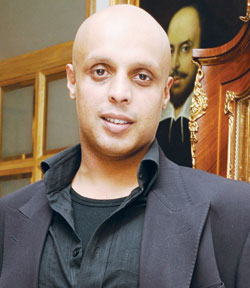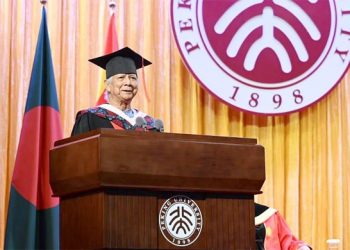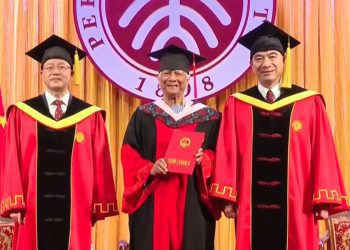      
 Towheed Feroze Towheed Feroze
The ongoing ferment across the USA over the recent death of an African American called George Floyd reminds one of the idiom: pot calling the kettle black! The US government has always portrayed itself as a staunch defender of human rights, equality and egality but the video footage showing Floyd being pinned down to the ground by a stolid faced policeman is proof enough that the subterfuge of social cohesion has finally been exposed.
Thanks to the mobile phones with video cameras. Have we ever thought how many violations of human rights across the world this device has brought out in the open? To be honest, the smart phone should be awarded the prize for being the most effective tool in helping us discover putrid truths about entrenched prejudices that have been, for ages, concealed by layers of pluralist rhetoric.
The incident involving George Floyd can be looked at from several angles with the most common being the festering racial tensions in the so called country of the free.
Americans or ‘black’ Americans:
I have an anathema towards using the word ‘black’ because it carries a demeaning connotation. African sounds perfect and therefore, people from African families living in other countries should not be called ‘black’. Think of the the oft used term: tall, dark and handsome! The ‘dark’ here is a word which carries mysticism and a certain degree of underlying charisma. You never hear: ‘tall, black and handsome’ right?
Anyway, in recent years there has been rising police brutality in the USA, especially directed towards people from African American backgrounds. The reason often showed is that people from these communities are more susceptible to crime. Common sense states when people are deprived of normal social privileges they tilt towards depravity.
The question which needs to be asked is if the US government provided enough legitimate opportunities to the people from African American communities to improve their social status? Also, the George Floyd incident has to be analysed in the context of the current global Corona Virus lockdown that has left millions unemployed, driving many to operate at the edge of legality. Reportedly, Floyd was arrested as he was trying to pass counterfeit notes.
With millions unemployed, facing acute shortages of food and basic essentials, it’s natural that survival instinct will drive many to break the law. Even if we accept that the detention of Floyd was justified, the treatment handed out to him certainly wasn’t. In a time of Corona induced desperation, the police action should have been compassionate and more empathetic.
US administration often foams at the mouth defending human rights, regularly pointing fingers at other nations for stifling free speech and disproportionate use of force. What we saw in Minneapolis is exactly what US is seen to vehemently denounce all over the world. Hence the usage of ‘double standards’ by many condemning disproportionate use of force by the US police in Minneapolis.
To look back in history, the champions of democracy have been complicit in steadfastly supporting so many tyrants, from the toppling of elected Chilean leader Salvador Allende (to put in place a dictator called Augusto Pinochet whose regime was mired in human rights abuses) to providing weapons to the Contra guerillas in Nicaragua to harass the leftist government which came to power through a mass revolution, overthrowing the US compliant (read stooge) regime of Samoza. The list of despots supported by the US is a long one.
And the way USA turned a blind eye to the monstrous violations of human rights by these tyrants is a complete abomination. One of the less known but notorious still was the support by the US government for the Argentine regime of General Rafael Videla which brought down the elected government of Isabel Peron. During the 1978 World Cup football, held in Argentina, Henry Kissinger, the US secretary of state made several visits to the country, with the most controversial one before a crucial Argentina – Peru match which the former (Argentina) had to win by 4 goals to reach the finals.
Before the match, Kissinger visited the room of team Peru which many Peruvian players found strange and then, in the game, or the travesty that followed, Peru went on to concede six goals – a highly controversial World Cup match which is still recalled for the political machinations in which Kissinger is supposed to have played a dubious part.
The commonly held belief is that Argentina had to move to the finals as the country’s regime wanted sporting glory to work as a catalyst to give it global credence. Since it was in the USA’s interest that the regime get recognition, Kissinger allegedly made the crucial visit before the game with Peru.
What happened behind closed doors we cannot say but several players who represented Peru that day have suggested that on the day of the match the out of field manoeuvers outclassed all strategies on the field.
US needs to look at internal resentment:
Now we come to the second angle of the Floyd tragedy: the cataclysmic eruption of public anger. There have been incidents in the past where African Americans were mistreated, maimed and killed by law enforcers but this time, the public fury has spread across the country.
Two reasons for this may be behind such an outburst: first, there was already simmering anger as to the perceived failure of the US government to tackle the Corona Virus catastrophe and, secondly, a long standing disgruntlement towards arbitrary police behavior, which was never addressed properly.
For earlier transgressions by law enforcers, perfunctory apologies were made time and again but the government or the state authority were never seen to take firm steps to discipline rogue elements within the police. With curfew imposed in several states, the message is clear: there is a deep rooted social aberration which was allowed to fester for decades.
Come to think of it, in the 70s and 80s, curfew was a common phenomenon in Bangladesh with the special situation declared to quell any possible social upheaval. At that time, developed nations used to take the sanctimonious stance, suggesting methods, in a distinctly patronizing tone, to address social anomalies in Bangladesh.
The use of ridicule while talking about Bangladesh and her never ending problems was not uncommon either. In fact, there is an appalling trend among many local journalists to unctuously ask visiting foreign dignitaries about how our own socio political afflictions can be properly addressed, as if they have reached the apotheosis of democracy and social inclusion.
I have often heard journalists seek advice from outsiders about how internal strife in Bangladesh can be settled though we now see that the exalted advisers need more advice about how to tackle race related tensions plus issues relating to failed integration.
The Brexit quagmire was also another wake up message for all of us because the strife and the anarchy that happened before UK finally left the union is proof that no country, irrespective of its wealth and development, can boast to having a perfect system in place.
The convulsions triggered by Floyd is another reminder that in the USA, the stars are not sparkling all the time; demons lurk underneath the fa�ade of social affluence which had never been admitted by any US government.
As for the current US administration, the line between democracy and despotism seems to have blurred a lot. President Trump’s greatest quality is that he does not feign benevolence. However, at times, the president has to appear as a mediator and not a provocateur. The language in his tweets was unseemly, lacking finesse. If Mr. Trump had apologized to the nation for the police savagery and promised to revamp the police force as a humane institution, the USA would not be in such turmoil today.
Perhaps he should read a little Shakespeare, who wrote in Measure for Measure: it’s excellent to have a giant’s strength, but it’s tyrannous to use it like a giant.
Towheed Feroze is a journalist and teaches at the University of Dhaka |












 Towheed Feroze
Towheed Feroze












Discussion about this post